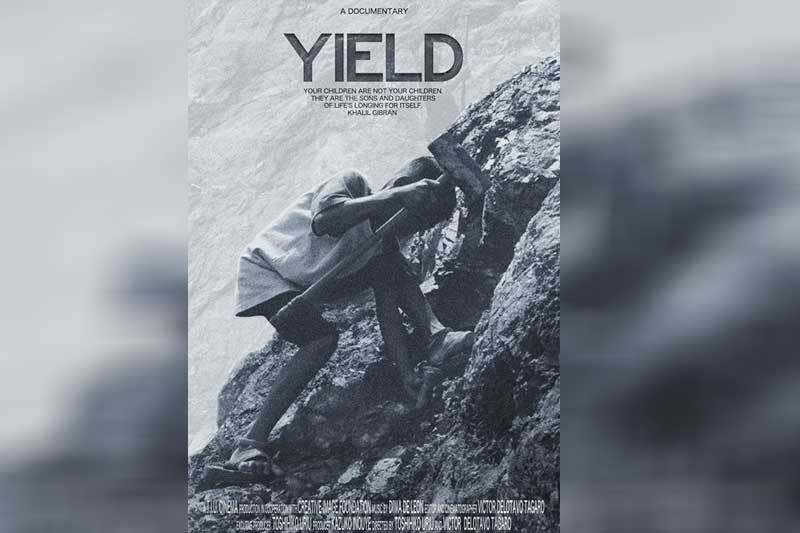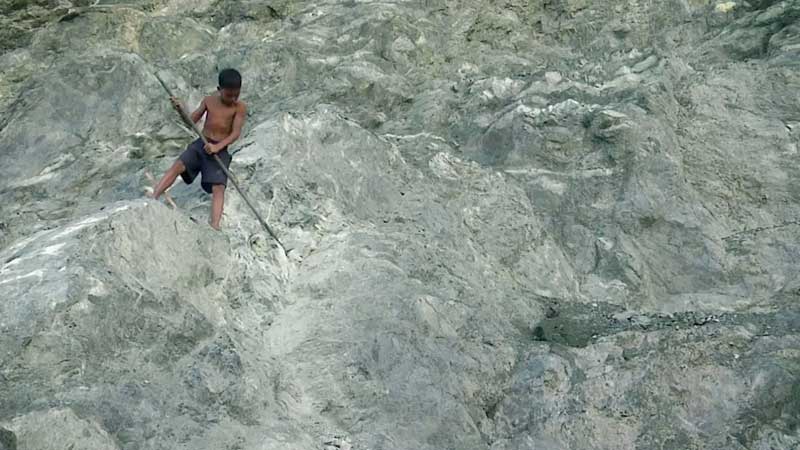A World Without Play

While ‘Yield’ follows the stories of children who have to toil in order to survive, it also champions the virtue of innocence, acknowledging that even the direst of situations cannot completely strip a child of his or her ability to hope.
In a way, the word “yield” is a unique one.
It is a homonym. The word’s two most prominent meanings, however, refer to opposing nuances. It can refer to the act of producing something, such as when a farm yields a bountiful harvest of crops. Strangely, it can also refer to the act of giving up something, to the act of surrendering. “The people have yielded to oppression.”
From one perspective, Victor Tagaro and Toshihiko Uryu’s documentary Yield, which deservedly won the top documentary prizes in both the Famas and Urian Awards, shows the process and rewards of labor. In one scene, one of its subjects brings a piece of rock he dove for to a smelter. After the rock is broken into several pieces, which are then exposed to extreme heat, a stunning metallic liquid dot is produced. The subject smiles, while the dot, now solid after being cooled, is resting on a piece of cloth. His hard work has yielded a tiny but valuable prize. The dot, on the other hand, will probably be sold to a goldsmith, turned into one of the many rings or necklaces arrayed among the many jewelry stores in the many malls of Metro Manila.
The subject, however, is a young boy. From this side, Yield becomes a documentary of what people existing at the fringes of a bustling economy have to give up or surrender for survival.
The documentary does not only focus on the boy who silts the ocean for gold. It also shows the efforts of a brood of three who toil under the sun’s heat, without protection or even proper clothing, carving the side of a severely scarred mountain for stones to be turned into the various condominiums and office buildings that line up the busy avenues of the metropolis. There is one striking scene in the film wherein the youngest of the boys, donning a polo shirt that is blatantly too big for him, has the toes of his little feet firmly gripping the jagged edges of the rocks while hammering the surface. The scene reveals how the boy is forced not only to don clothes better fitted to adults, but also to labor like an adult.
While the focus on children sweating or suffering through fates that are beyond their control may give the impression of a film that mines misery for spectacle, turning very real lives into artsy portraits of human strife, it is very clear that Tagaro and Uryu grant their subjects the humanity their stations in life have deprived them. The film never dwells on suffering. It puts poignant moments of precious happiness in the spotlight, making a very distinct impression that notwithstanding the subjects’ being forced to grow up faster, they still indulge in the pleasures of childhood.

Yield won the top documentary prizes in the FAMAS and Urian Awards.
The young boy who dives for grams of gold shines in both amazement and satisfaction as he looks at the fruit of his labor. The young girl who is tasked to harvest vegetables graduates from school. A boy suffering from hydrocephalus is always shown with a smiling face, almost oblivious to his bleak future. Yield champions the virtue of innocence. It acknowledges that even the direst of situations cannot completely strip a child of his or her ability to hope, to yearn for happiness, and to find joy in the slightest instance of bliss. It avoids depicting its subjects as victims. It only hints at their oppressors, subtly blaming the demands of a bustling but overtly unfair economy for the tragedies of the children.
Near the end of the film, Tagaro and Uryu expose the extent of the strife. They zoom out from the carved mountain where the brood of stonecutters are working, showing a town, then showing vast landscapes, before ending with an overwhelming scenery of damaged nature foregrounded by heaps of trash. With that sequence, the film connects the children’s suffering with the viewers, putting them within that vicious cycle where the poorest of the poor must yield their dignity and youth for a bountiful yield that only a very few can enjoy.
Yield is powerful. Its images, compiled from footage dedicatedly gathered by Tagaro and Uryu over a prolonged period, are elegantly edited to not only portray coherent narratives out of disparate experiences but also to showcase the heartbreaking passage of time, to instill the fragile value of childhood that is quickly being taken away. The film shines an indelible light on a world, existing but somewhat hidden from those who prefer a comfortable, guiltless existence, where play is a luxury that only the privileged can afford.















